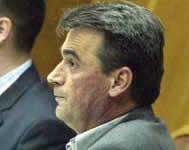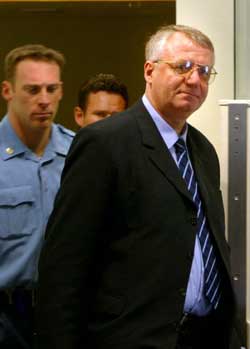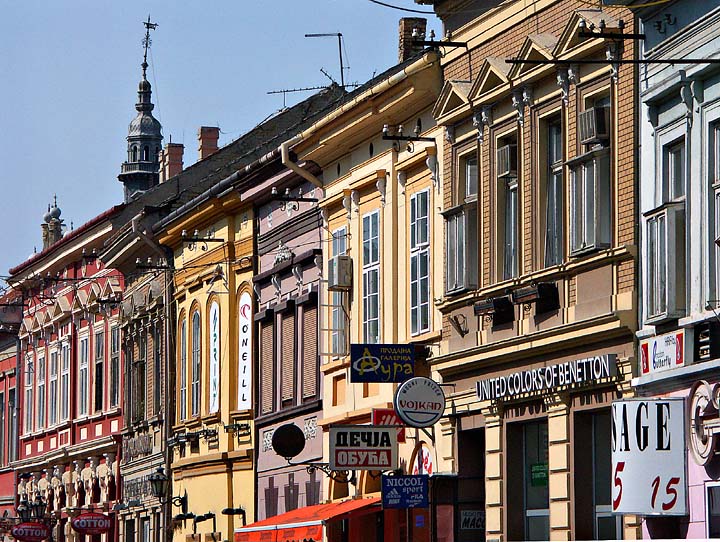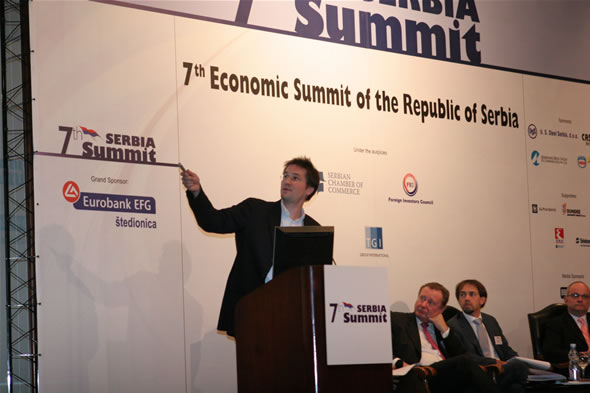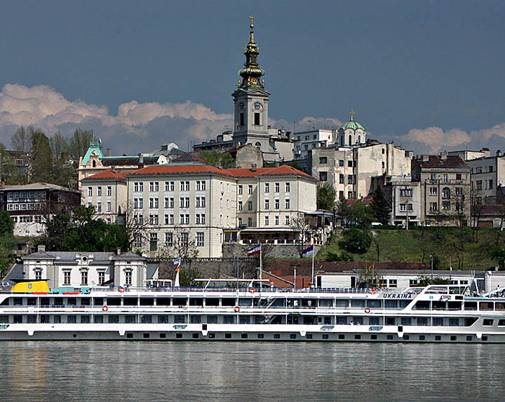
Belgrade, October 2007. I arrive in Belgrade to give a presentation at the 7th Serbian Economic Summit. The summit is interesting: initially some 450 people, 10 cameras, apparently huge interest. It takes the man reading out the welcoming speech of prime minister Kostunica about 30 seconds to make the transition from welcoming potential foreign investors to underlining the importance of the Kosovo issue. Later the foreign minister of Serbia tells the audience that in case of a recognition of Kosovo independence “all bets in the region are off”. This dramatic warning strikes me as a strange way of reassuring potential investors that Serbia deserves their attention. By that time the room has emptied and the audience has fallen to less than 100. The foreign minister, Vuk Jeremic, young, western educated and speaking with a strong American accent, is a member of the Democratic Party. If he argues like this, I wonder, what about the rest of the political class? It is a question I will pose to many people in the coming two weeks.
In fact, the main purpose of this trip, spending almost 2 weeks in Belgrade and Novi Sad, is to find out where Serbia stands on the eve of a possible decision on Kosovo. It is also to try to define the content of a film on Serbia we are working on in the context of a large Balkan documentary series to be broadcast on German and Austrian TV in spring 2008.
How can one explain the paradox of Serbia (so much potential, and so much waste of it at the same time) to a broader outside public? As I meet a succession of analysts, politicians and friends from civil society in different cafes in walking distance from Terazije a sense of gloom, reinforced by the rain and autumn cold that has chased away the last warm days, thickens.
I will not quote my friends here directly and most of them – particularly those in government – spoke as always on condition of anonymity, but the overwhelming emotion was that of opportunities wasted, of a revolution (the toppling of Milosevic and the dismantling of his regime) agonisingly incomplete, of sterile public debates dominated (again) by the issue of Kosovo and of the wrong people (re)gaining confidence.
One friend, for a long period already very active in Serbian civil society, admits that she cannot bear to read local papers or watch Serbian TV anymore, or she would risk loosing her sanity and any ability to act. Another friend, in an important political position, shrugs her shoulders when asked about the increasingly aggressive statements coming from some members of her own government. The worrying thing, quite a few note, is that the new assertiveness of Kostunica in particular appears to be working, extracting concessions from the outside world without having to make any compromises. What the EU was not willing to give to Zoran Djindic it is now going to give to Kostunica, one says, not because he is nice but because he is difficult. Stubborness and playing the Russia card on Kosovo appears to be working too.
The appropriate joke circulating in Belgrade is this: Kostunica is like the man standing in front of a coffee machine throwing in money and getting out coffee cup after coffee cup. After doing this thirty times and standing surrounded by all his purchases somebody in the queue behind him asks when he is going to stop. Why should I stop, the man responds, just when I am winning? (one might add: regardless of how much it might cost and what to do with all the cold coffee afterwards).
What would Kostunica do if the EU were to recognise Kosovo independence, I ask. “I genuinely do not know”, one member of the government tells me, “we currently just follow him on this.” Is the flirting with an increasingly authoritarian Russia anything serious or a passing diplomatic manouvre? “I can no longer tell”, says another.
As always, there is no shortage of impressive individuals in Belgrade who have not given up the fight for a more open, more cosmopolitan Serbia. I may be wrong and it may be the mood induced also by the weather but rarely have these people – let me call them Serbia’s Europeanisers – seemed as exhausted as now in the period since 2000.
As one friend, Dejan Anastasijevic, puts it, Serbia is like a car that looks ok from the outside, but one simply cannot get it to start moving in the right direction. The wheels turn, but there is something that still blocks serious movement. Everybody has of course their own part of the answer what it is that blocks progress. For Dejan the key is the unreformed state security institutions at the heart of Serbian politics. The secret service remains unaccountable to parliament, the courts, even the government.
For Natasa Kandic, one of the most impressive defenders of human rights in the whole region, it is also the lack of willingness of facing up to the dark legacies of the immediate past. Her response is activism, as it has been for two decades: working to turn her Humanitarian Law Centre into a Simon Wiesental type centre to continue to be able to identify perpetrators of actrocities in the wars of the 1990s and bring them to belated justice.
For movie director Milutin Petrovic (known outside through his film “Land of truth, love and freedom”) the obvious turning point in Serbia’s post-Milosevic story is the assassination of prime minister Zoran Djindic, and the inability so far to get to the bottom of this sordid story. Milutin prepares to launch his own campaign for enlightenment with a documentary on the Djincic assassination.
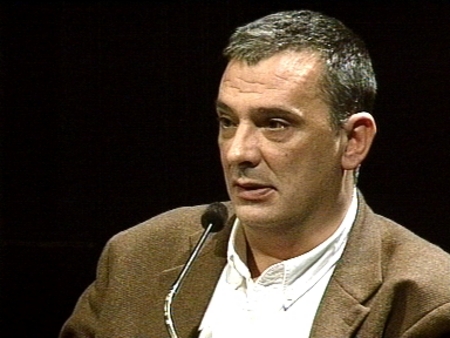
Dejan Anastasijevic, Belgrade journalist
During the time that I am in Belgrade the cover of Vreme also highlights an article by Dejan on the failed assassination attempt carried out only a few months ago, when a bomb was placed on the window of his apartment. What is disturbing is both the event itself and the failure of a real response by official institutions in its wake. The article sums up much of the atmosphere in Belgrade in this uncertain autumn of 2007. I recommend any visitor to the Rumeli Observer to read it in full:
Vreme, October 2007: Six months later
Who put bombs on my windowsill?
by: Dejan Anastasijevic
It is six months this Sunday since a hand grenade exploded on the windowsill of my apartment. The material damage caused by the explosion was a broken window and a room drilled with shrapnel, but more permanent damage was done to my life and work. In spite of claims by top politicians and police officials that my case would have the highest priority, the perpetrator has still not been found. During these last six months, I have tried not to disrupt the investigation with public statements or criticisms of any public agency: I was hoping that, in spite of everything, at least some part of the state apparatus had a genuine interest in solving my case. Now, I begin to believe that my hope was unfounded.
My initial idea was to present this text as an open letter to the Minister of Interior, Mr. Dragan Jocic. In the meantime I changed my mind: I do not believe that the minister would reply. It is even less likely that the letter would bring any consequences for the minister and his subordinates for their failure to defend my constitutional and legal right to live. That right is denied because I go to bed every night aware that the perpetrators could come back and finish the job they started six months ago.
That is why, instead of the minister, I address myself to the readers of “Vreme”, who deserve much more to hear what I have to say. Since the investigation did not bring any results, I have had to play private detective on my own case. I admit that I do not have enough evidence to accuse anybody, but I think that there are enough clues to conclude that the attack on me and my family came from the political/police underworld which, without major problems, has managed to survive 5th October and Operation Sabre. This is the stone the state dares not look under, for fear of disturbing the vermin who prefer dark places. The following text is a simple presentation of facts, from the description of the event to information about motives and political background. Readers will be able to draw their own conclusions.
CRIME SCENE BELGRADE: The hand grenade exploded at a quarter to three in the morning of 14th April this year, on the windowsill of my bedroom facing the street. It is an old-fashioned, double-glazed window with a relatively narrow frame and, looking from the street, it is a little over two meters above ground. The outside wooden blinds were half pulled down and the Venetian blinds drawn from the inside. This explains why the attacker did not try to throw the granade inside: it might have bounced off the inner window frame and fallen back into the street. That is why he decided to use two grenades, as the police discovered, connected with tape and placed on the windowsill. He was obviously familiar with this type of grenade – he knew that one would not activate the other, so he pulled out the firing pin from both. Luckily, the explosion of the first grenade dislodged the detonator of the second grenade from the chamber, and the grenade body flew some 20 meters to the next door entrance. Another fortunate factor was that the Venetian blinds absorbed part of the blast, reflecting it back into the street. In spite of that, the bedroom was full of shattered glass and shrapnel, which drilled into the ceiling and walls. Thanks to the fact that the bed is below the window level, they missed my wife and me. Anyone standing in the room at that moment would not have survived. If both grenades had exploded, the cumulative effect would have been enough to injure both of us. This way, we were very lucky, as was our daughter who at that time was returning home from a party (she called around half past two to say she was on her way). If she had come only a few minutes earlier, she would have been in the apartment at the moment of the explosion.
In the street where I live there are no CCTV cameras, but they are situated in neighbouring streets where there are some banks and embassies. The police took all the tapes, but did not find anyone. “As if a ghost walked past,” was the comment of one inspector, concluding that the attacker took care not to be visible. Police also talked to the neighbours in a few apartment blocks around, but nobody noticed or heard anything suspicious. A reconstruction of the event would go like this: the attacker came walking (a car would not have gone unnoticed in my little street), pulled the firing pins, placed the grenades on the windowsill and sheltered from the explosion in the next-door building entrance, knowing that the time from activating to exploding is three to five seconds. After the explosion, all the neighbours came to their windows but looked only in the direction of the window where the smoke was coming from, allowing him to leave unnoticed. The fact that police blocked the area within ten minutes without catching him means that he had a car waiting for him close by.
I have to say that police arrived five minutes after the call and that their work was more than correct.
I can say the same about the director of police, Miroslav Veljovic, who helped me through the procedure of giving evidence at the police station. Unfortunately, after that the investigation became complicated.
ANASTASIJEVIĆ ON TWO LISTS: Vojislav Šešelj…
SCORPIONS AND NEIGHBOURS: Encouraged by the positive reaction of the public and promises from politicians that my case would be solved, I did not take a close interest in the investigating procedure – I believed, then, that it was best to let them get on with the job. A whole month later, I found out that the case was still in the municipal prosecutor’s office (in charge of minor offences), and that the investigation had been given to the department of the city police responsible for arson. This was despite claims from politicians, as well as Veljovic himself, that my case was attempted murder with terrorist elements. In the meantime, the press started speculating, based on unnamed police sources, that I had set the bomb in order to draw attention to myself. At the same time, I found out that the physical evidence collected at the scene will probably not be used as evidence at all, because somebody forgot to send the appropriate order to the laboratory – analysis without appropriate documentation is not admissible in court. It was almost three months later that the district prosecutor’s office, in charge for serious criminal cases, took over the case and brought statepolice into the investigation. This was another fact that I found out only indirectly, because after the initial conversations during the first few days after the attack, nobody was interested in talking to me officially.
…and Jovica Stanisic
I found out from the press that police questioned a group of “Scorpions”, a paramilitary organisation from Šid, but released them soon after. The “Scorpions” were suspects because I had written about them several times, and two days before the explosion I had talked on Radio B92 and criticised the mild sentence that a group of their members had received for the murder of six Bosnians from Srebrenica. I was not sure that members of the Scorpions had came from Šid to Belgrade to take revenge for a single radio comment, because others talked and wrote about them much more harshly then I did. They even wrote a touching message to the head of the Fund for Humanitarian Law, Natasa Kandic, in which they categorically denied involvement in the attack, saying “Dear Natasa, at least you know us, we didn’t do this…”. I tend to believe them, at least in this case.
Two or three months after the explosion, neighbours who live a few streets from me told me that police came to ask them if they saw or heard anything that night. Although they said they did not, they were asked to come to the police station and give a written statement. When they asked why, they were told that for every statement taken, a policeman gets three points, and their performance is assessed based on their number of points. I remembered then that Minister Jocic had said that they questioned over 600 witnesses in my case – that would be twenty Scorpions and 580 neighbours. All in all, a total of 1800 points.
ŠEŠELJ’S LIST: Now is the time to say something that so far I have not spoken about, in the interests of the investigation. Last year I was warned by the Hague Tribunal to be careful, because leader of the Radicals Vojislav Seselj had made a list of potential witnesses who should be eliminated or intimidated, and my name is on that list. Seselj’s wife Jadranka took the list to Belgrade and, after that was discovered, she was not permitted to visit her husband in prison for some time. The reason for putting my name on the list was my testimony against Slobodan Milosevic in 2002, from which one part, concerning Seselj’s role in Miloevic’s regime and his ties with State Security, was included by the Tribunal as evidence against him. That part will be presented to the court in writing – so I will not be called as a witness – but Seselj has the right to cross-examine me and demand that the evidence be excluded if I do not come or if, god forbid, something happens to me. By the way, a few months ago at an interim hearing, Seselj asked the court to dismiss three written statements against him because the authors had died in the meantime. I almost became the fourth.
There are two more circumstances showing a certain unhealthy obsession of the Radicals with me. Even three years ago, secretary general of SRS (Serbian Radical Party) Aleksandar Vucic held a press conference entirely dedicated to me and my colleague Jovan Dulovic, during which he distributed some written material intended to show us as morally worthless people and traitors. That material, judging by the format, style and jargon, was provided by BIA, Serbian main intelligence agency, which, bearing in mind the deep and extensive connections between the Radicals and the secret police, should not surprise anyone. Another example is that Seselj, in his book The devil’s Apprentice – Criminal Pope John Paul the Second from 2006, dedicated almost one hundred and thirty pages (out of a thousand) to me, again presenting me as a traitor and “Belgrade street scum.”
At the time when I got the warning from the Hague, I did not take it too seriously, but after the explosion I told the police about it. I got sympathetic looks, but I noticed that they did not write anything down. I also told them something I found out from a source whose name has to be concealed – that Seselj’s list was given to a person close to him with very strong connections to the underworld. That is a man who has already been convicted to jail for a violent crime some years ago, but somehow managed to avoid serving the sentence. In informal conversation, I mentioned the name of that person to the deputy district prosecutor in charge of my case. He also looked at me sympathetically.
JOVICA’S LIST: At the beginning of this month, I came to know something else and, since I have not yet shared it with the police, this is the opportunity to do so. People from the Hague Tribunal contacted me again, this time asking me to be a witness against Jovica Stanisic. That surprised me because I have never met Stanisic, and everything I know about him I wrote in “Vreme” long time ago. I was even more surprised when they told me that my name was placed on the list of witnesses six months ago (April 2nd), and that the list was delivered to Stanisic’s legal counsel. When I asked why I was not informed of this, I was told that it was overlooked “because of high turnover of personnel at the Tribunal”. I asked the gentlemen from the Tribunal if they have any better witnesses than me, and was told that there was a problem, because several people from the list had suddenly died, and others either refused to testify or changed their testimony.
I have to say that I was shocked at such a casual attitude from the Tribunal people, whose work I have long supported, towards witnesses in general and particularly me. I asked the prosecutors, as politely as I could, to erase my name from the list and inform Stanisic’s lawyers. They said they would do that, but in case they haven’t done so, I want to tell everybody one more time: I will not testify against Stanisic, and I will not testify against Seselj unless I am subpoenaed by the defence (in which case I would receive a court order).
I have to stress one more time that everything I have mentioned are facts, but that I do not dare to claim, based only on those facts, that Volislav Seselj or Jovica Stanisic are in any way involved in the case of the bombs on my window. However, I do accuse the agencies responsible for the investigation and for finding the perpetrators of not being willing and brave enough to prevent the attack and keep my family safe. I admit that I was unpleasantly surprised by the recent statement from Minister Jocic in which he said that my case will be difficult to solve “because it is not easy to resolve the case if there is no reasonable cause”. In this way, the Minister made the whole story out to be an act of god, almost like a natural disaster.
DELAYED ACTION: I said at the beginning of this article that the bomb, although it did not hit its target, left permanent consequences on my work and my life. As a journalist writing for the print, I had a privilege to be relatively unrecognisable to the general public. That changed somewhat after I testified against Milosevic and started appearing as a guest on some TV programs, but after the attack, it has become unbearable. Put simply, the publicity that the bomb has attracted (and unfortunately not my articles) makes my life as a journalist difficult. When I enter a room, I have the impression that everybody is staring at me, and sometimes I hear “Look out, bomb!”. I am sick of being asked by people “What’s up, you still alive?” although I know they do not mean anything bad. I would like to be anonymous again, at least for a while, but I know that this is impossible. My wife and daughter also have to cope with publicity that is neither welcome nor deserved.
However, I am certain that the temperature would go down if, by some miracle, the attackers were caught. I believe in that miracle less and less, in the same way as I do not believe that the murderers of Slavko Cuvurija, Milan Pantic or any other journalist or citizen who dares to get in the way of somebody powerful and unscrupulous will be caught.
Finally, I want to say something else: I do not intend to change my job, move to another address or a higher floor, nor turn my apartment into a bunker. I will not hire private bodyguards nor ask police to provide me one, but I will insist that they protect me from hooligans and criminals, just as they should protect everybody else. In my case, they slipped up.
And one other thing: in the aftermath of the bomb, when there were numerous statements from political leaders condemning what had happened, announcing their determination to solve the case, declaring that it was an attack on the state and the constitution, I must admit that I had some hope that my case would serve as an opportunity to shine some light into the darkness that we have still not escaped from since October 5th. Now I see that I was naïve; new opportunities, unfortunately, are yet to come.

